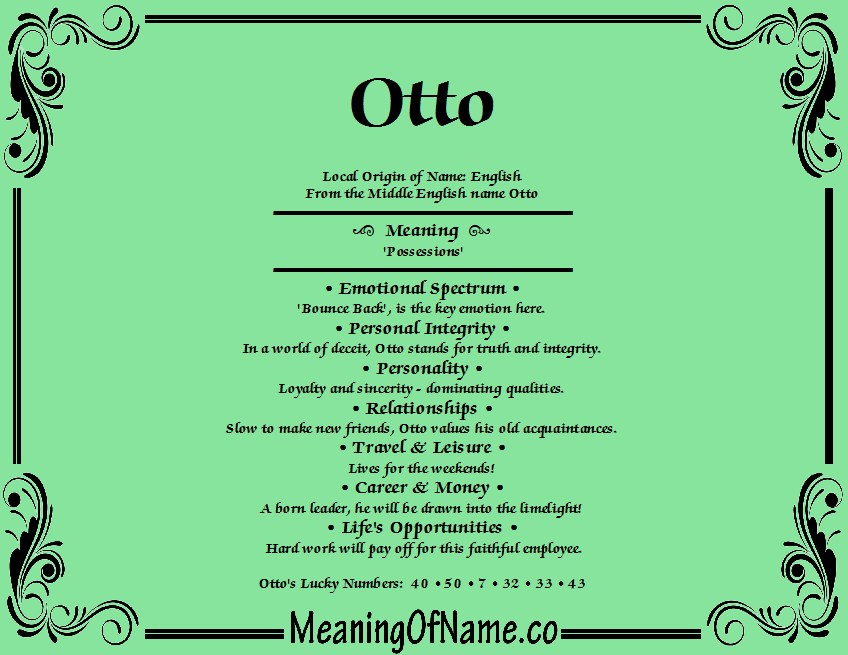Otto Name Meaning: A Comprehensive Exploration Of History, Significance, And Cultural Impact
Names carry deep meanings and cultural significance, shaping our identities and connecting us to our heritage. The name Otto is no exception, as it has a rich history and a profound meaning that resonates across generations. In this article, we will explore the origins, symbolism, and cultural relevance of the name Otto, providing you with a comprehensive understanding of its importance in modern and historical contexts.
Understanding the Otto name meaning is more than just knowing its etymology. It is about uncovering the stories, traditions, and values associated with this name. Whether you are considering naming your child Otto, researching your family history, or simply curious about its significance, this article will provide valuable insights.
Join us as we delve into the fascinating world of the name Otto, exploring its linguistic roots, cultural associations, and the lives of notable individuals who have borne this name. By the end of this article, you will have a deeper appreciation for the timeless charm and enduring legacy of the name Otto.
Read also:Simone Biles Photoshoot A Glimpse Into The Iconic Moments
Table of Contents
- Etymology and Linguistic Roots of Otto
- Historical Significance of the Name Otto
- Cultural Impact of the Name Otto
- Famous People Named Otto
- Popularity Trends of the Name Otto
- Symbolism and Meaning of Otto
- Name Variants and Nicknames
- Otto in Family Heritage
- Modern Usage of the Name Otto
- Conclusion and Final Thoughts
Etymology and Linguistic Roots of Otto
The name Otto originates from the Old High German word "audo" or "oddo," meaning "wealth" or "fortune." Over time, this name evolved into various forms across different cultures, but its core meaning remained tied to prosperity and abundance. In medieval Europe, Otto became a popular choice for nobility and royalty, further cementing its association with prestige and power.
Etymologically, Otto belongs to the class of Germanic names that emphasize material wealth and social status. This linguistic root connects the name to other Germanic names like Odo and Otton, which share similar meanings. The name's simplicity and strength have contributed to its enduring appeal across centuries.
Historical Evolution of Otto
As societies developed, the name Otto adapted to changing linguistic trends. During the Middle Ages, it became particularly popular in Germany, where it was often given to sons of influential families. The name's association with wealth and leadership made it a favored choice among the aristocracy.
- Old High German origins: "Audo" meaning wealth
- Medieval adoption by European nobility
- Modern variations in different languages
Historical Significance of the Name Otto
Throughout history, the name Otto has been linked to notable figures who have left an indelible mark on their respective fields. From emperors to inventors, individuals named Otto have played pivotal roles in shaping the world. One of the most famous historical figures is Otto I, also known as Otto the Great, who served as the first Holy Roman Emperor from 962 to 973.
Otto's historical significance extends beyond politics. In the realm of science and technology, Otto Lilienthal, a German aviation pioneer, made groundbreaking contributions to the development of flight. His work laid the foundation for modern aviation and inspired future generations of engineers and inventors.
Key Historical Figures Named Otto
Here are some of the most influential individuals who have borne the name Otto:
Read also:Paul Mescal Haircut The Ultimate Guide To His Signature Style
- Otto I: The first Holy Roman Emperor
- Otto Lilienthal: German aviation pioneer
- Otto von Bismarck: Prussian statesman and architect of German unification
Cultural Impact of the Name Otto
The name Otto has transcended its linguistic roots to become a symbol of cultural significance in various societies. In literature, art, and music, Otto has been portrayed as a character representing strength, wisdom, and resilience. Its cultural impact is evident in the works of renowned authors and artists who have drawn inspiration from the name's rich history.
In contemporary culture, Otto continues to resonate with audiences worldwide. The name's timeless appeal has made it a popular choice for characters in films, television shows, and books. Its association with strength and integrity adds depth to the characters who bear this name, making them memorable and relatable.
Cultural References to Otto
- Character portrayals in literature and film
- Music and art inspired by the name Otto
- Modern interpretations in pop culture
Famous People Named Otto
Throughout history, numerous individuals named Otto have achieved fame and recognition in various fields. Their contributions have not only elevated the name's reputation but also enriched the cultural landscape. Below is a table highlighting some of the most notable Ottos:
| Name | Occupation | Country | Years Active |
|---|---|---|---|
| Otto I | Emperor | Germany | 962-973 |
| Otto Lilienthal | Aviation Pioneer | Germany | 1891-1896 |
| Otto von Bismarck | Statesman | Germany | 1862-1890 |
These individuals exemplify the qualities associated with the name Otto, such as leadership, innovation, and perseverance. Their achievements serve as a testament to the name's enduring legacy and influence.
Popularity Trends of the Name Otto
While the name Otto has experienced fluctuations in popularity over the years, it remains a timeless choice for parents seeking a classic and meaningful name. According to data from the Social Security Administration, Otto's popularity in the United States peaked in the early 20th century and has seen a resurgence in recent years.
Globally, Otto remains a popular choice, particularly in German-speaking countries and Scandinavia. Its simplicity and strong connotations continue to appeal to parents who value tradition and substance in naming their children.
Statistical Insights into Otto's Popularity
- Peak popularity in the early 1900s
- Recent resurgence in popularity
- Global variations in usage
Symbolism and Meaning of Otto
The name Otto carries deep symbolism that reflects its etymological roots. As a name associated with wealth and fortune, it embodies the qualities of prosperity, abundance, and success. In a broader sense, Otto represents strength, resilience, and leadership, qualities that have been exemplified by its historical and cultural bearers.
Symbolically, Otto can also be seen as a name that bridges the past and the present, connecting individuals to their heritage while inspiring them to achieve greatness in their own lives. Its timeless appeal lies in its ability to convey both tradition and innovation, making it a versatile choice for modern families.
Key Symbolic Associations of Otto
- Wealth and prosperity
- Strength and resilience
- Leadership and innovation
Name Variants and Nicknames
While Otto remains a classic and timeless name, it has inspired numerous variants and nicknames across different cultures. These variations reflect the name's adaptability and universal appeal. Some popular variants include Odo, Ottis, and Ottavio, each with its own unique charm and significance.
Nicknames for Otto, such as Ottie or Oti, add a personal touch to the name while maintaining its core meaning. These variations allow individuals to express their individuality while honoring the name's rich heritage.
Common Variants and Nicknames
- Odo
- Ottis
- Ottavio
- Ottie
Otto in Family Heritage
For many families, the name Otto holds special significance as a connection to their ancestors and cultural roots. Passed down through generations, it serves as a reminder of the values and traditions that define their heritage. Whether used as a first name or a middle name, Otto continues to play an important role in preserving family legacies.
In genealogical research, the name Otto often appears as a key identifier, helping researchers trace family lineages and uncover historical connections. Its presence in family trees highlights the importance of names in preserving cultural identities and familial bonds.
Genealogical Importance of Otto
- Connection to family history
- Role in genealogical research
- Cultural significance in family traditions
Modern Usage of the Name Otto
In the modern era, the name Otto continues to thrive, balancing its historical roots with contemporary appeal. Its simplicity and strength make it a popular choice for parents seeking a name that is both meaningful and timeless. As societal trends shift, Otto's enduring qualities ensure its relevance in today's world.
With the rise of global connectivity, the name Otto has gained exposure across diverse cultures, further solidifying its place as a universal name. Its ability to adapt to changing linguistic and cultural contexts underscores its versatility and appeal.
Contemporary Trends in Naming
- Timeless appeal in modern naming trends
- Global adoption and adaptation
- Balance of tradition and innovation
Conclusion and Final Thoughts
In conclusion, the name Otto carries a profound meaning that resonates across generations and cultures. From its etymological roots in Old High German to its historical and cultural significance, Otto remains a name of enduring value and importance. Its association with wealth, strength, and leadership continues to inspire individuals and families worldwide.
As you consider the Otto name meaning for your own purposes, whether personal or professional, remember the rich heritage and timeless appeal it represents. We invite you to share your thoughts and experiences in the comments below, and explore other articles on our site for further insights into the world of names and their meanings.
Thank you for joining us on this journey to uncover the significance of the name Otto. We hope this article has provided you with valuable knowledge and inspiration.
Sources:
- Social Security Administration: Baby Name Popularity
- Encyclopedia Britannica: Otto I
- History.com: Otto Lilienthal


